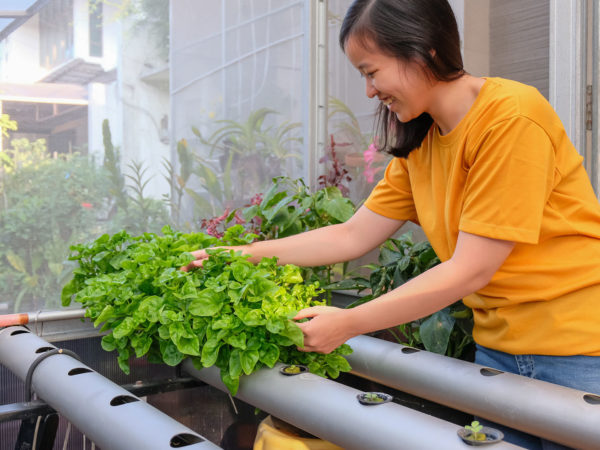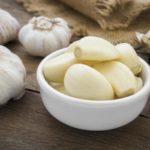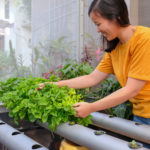Are Hydroponic Vegetables Healthier?
Is there any objective evidence that produce grown using hydroponic methods is more nutritious than soil-grown foods?
Andrew Weil, M.D. | June 14, 2024

Hydroponic gardening is the cultivation of plants without soil. Plants grown in a soil-less nutrient mixture don’t need the amount of space required for traditional farming, nor do they need the herbicides and pesticides that so many commercial producers use on their products. Does that make the products healthier or more nutritious than soil-grown varieties? The answer is not straightforward. Just as the quality of traditionally grown foods depends on many factors, starting with the soil, so does the quality of hydroponically grown products depend on many variables, starting with the matrix in which they are grown.
One advantage of hydroponic production is the level of control a grower can exert over those variables. Traditionally produced crops may be grown in poor soil or exposed to chemicals that affect them during their growth, while hydroponic growers can manage every detail of how and what their plants are fed. The choices the growers make affect the ultimate product – but we, the consumers of those products – have no way of knowing those details. So, the answer to your question is: It depends.
For starters, there are several different growing methods that are generally referred to as hydroponic. In some, plants are rooted in a growth medium that replaces soil, then irrigated or bathed in a nutrient solution. In others, the exposed roots are either misted or bathed directly by the liquid nutrients. Depending on the growth medium and the nutrient solution, hydroponic plants could end up more, less, or equally nutritious when compared to their soil-based counterparts.
In a 2021 paper published in the journal Scientia Horticulturae, researchers reported the results of a controlled study that compared tomatoes grown in soil to those grown in two different kinds of hydroponic growth systems (one called drip irrigation and the other called deep-water culture). The results showed that the fruit yield and sugar levels were similar among all three methods; tomatoes grown using either hydroponic system required less water than the soil-based tomatoes; and levels of lycopene and β-carotene in tomatoes grown using the deep-water culture method were either similar to or significantly higher compared to the other two. That is encouraging.
The science of plant growth, however, is very complex, and hydroponic farming is still a developing field. As more studies are done and more growers develop expertise in maximizing the nutritional value of their produce, I hope that fruits and vegetables grown this way become as healthy (and as tasty) as those grown in soil.
There’s a lot to like about hydroponic farming – it is energy- and water-efficient and it can be performed almost anywhere, even in the middle of cities, making it easier and faster to bring produce to market. In an era of increasing global population and greater competition for resources, these are both excellent arguments for the continued development of hydroponics. Someday soon, produce grown this way may predictably and objectively match or exceed the nutritional value of soil-grown food. What it doesn’t offer yet, subjectively, is that burst of summer flavor that comes with tomatoes sun-ripened in your own garden or in the fields of a competent, local organic farmer. (See also: Growing Vegetables: Hydroponic or Organic?)
Andrew Weil, M.D.
Sources
Sambo P, Nicoletto C, Giro A, Pii Y, Valentinuzzi F, Mimmo T, Lugli P, Orzes G, Mazzetto F, Astolfi S, Terzano R, Cesco S. Hydroponic Solutions for Soilless Production Systems: Issues and Opportunities in a Smart Agriculture Perspective. Front Plant Sci. 2019 Jul 24;10:923. doi: 10.3389/fpls.2019.00923. PMID: 31396245; PMCID: PMC6668597. pubmed.ncbi.nlm.nih/31396245/
Verdoliva SG, Gwyn-Jones D, Detheridge A, Robson P. Controlled comparisons between soil and hydroponic systems reveal increased water use efficiency and higher lycopene and β-carotene contents in hydroponically grown tomatoes. Sci Hortic. 2021 Mar 15;279:109896. doi: 10.1016/j.scienta.2021.109896. PMID: 33731973; PMCID: PMC7885021. pubmed.ncbi.nlm.nih/33731973/
Fabio Valentinuzzi, Youry Pii, Gianpiero Vigani, Martin Lehmann, Stefano Cesco, Tanja Mimmo, Phosphorus and iron deficiencies induce a metabolic reprogramming and affect the exudation traits of the woody plant Fragaria×ananassa, Journal of Experimental Botany, Volume 66, Issue 20, September 2015, Pages 6483–6495, doi/10.1093/jxb/erv364 academic.oup/jxb/article/66/20/6483/554190
trees/gardening-and-landscaping/hydroponic-drip-system
axaxl/fast-fast-forward/articles/going-green-with-hydroponics
extension.unr/publication.aspx?PubID=2756
cornucopia/2018/01/nutrients-come-healthy-soil-hydroponics
agritecture/blog/2020/3/24/are-hydroponic-vegetables-as-nutritious-as-those-grown-in-soil
Originally Posted December 2007. Updated June 2024.












